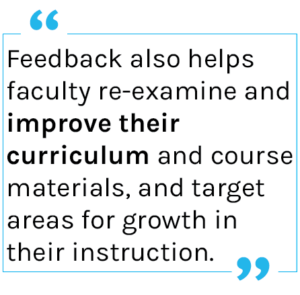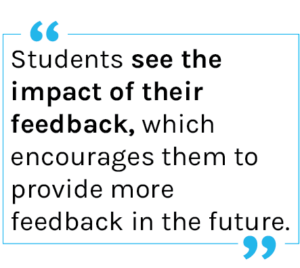What are course evaluations and why are they important for higher education?
Course evaluations have been a practice at colleges and universities for a long time. They offer students the chance to share their honest feedback about course content or teaching methods, and provide faculty with a valuable understanding of the student experience. HigherEd institutions are, in some cases, changing the process of course evaluations to minimize bias and elicit thoughtful, actionable feedback, and leveraging digital tools to do so. Read on to learn more about how course evaluations help both students and faculty, and how your institution can examine and improve your course review process.
What is a course evaluation?
A course evaluation is a student survey, usually conducted at the end of a course or semester, that gives students the chance to provide feedback on the course content, the instructor, and the effectiveness of the curriculum. At many institutions, course evaluations are standardized across campus. Course evaluations are usually anonymous to encourage honest feedback. Administrators generally receive and review the results of course evaluations and use them to help evaluate professors and improve course material.
What are the benefits of course evaluations?
Course evaluations have a number of benefits for students, faculty, and the overall institution.
 Student course reviews can help instructors better understand how to meet the specific needs of their students. Feedback also helps faculty re-examine and improve their curriculum and course materials, and target areas for growth in their instruction methods.
Student course reviews can help instructors better understand how to meet the specific needs of their students. Feedback also helps faculty re-examine and improve their curriculum and course materials, and target areas for growth in their instruction methods.
Students benefit from course evaluations because providing feedback and commentary gives them an active role in their educational experience—they have the power to shape the future of a course and express their concerns or appreciation.
Course evaluations can also help administrators and department staff by providing more insights into an instructor’s performance and growth. Overall collected feedback can factor into promotion or course assignment decisions.
Course feedback can be especially important in times of change. For instance, if a professor is teaching a brand-new course, or if a course is being offered in a new format (like online), course evaluations and assessments can provide vital insight into the success of a new instructor or modality.
Why is PeopleAdmin’s Course Evaluations different?
While course evaluations are an important part of curriculum and faculty growth at many institutions, there are some debates about their effectiveness and impact. For instance, there is a lot of bias in course evaluations – female professors tend to get lower scores across the board, even though, according the Chronicle, “Having a female instructor is correlated with higher student achievement.” It can also be a challenge to extract actionable, useful feedback from evaluations when less than half of four-year students leave long-form comments for their professors. There’s also the challenge of end-of-semester feedback: when students provide constructive feedback about a curriculum at the end of a course, it’s too late for a professor to shift gears to support those students. They might be able to make a difference to the next group, but can’t impact their students in real-time.
PeopleAdmin’s Course Evaluations helps to solve these challenges. Using modern survey techniques and focused questions, Course Evaluations helps get insightful, actionable course feedback from students so that faculty and administrators can create impactful change. There has been research about the benefits of performing course evaluations in a classroom setting vs. asynchronously online. While some faculty had concerns that students wouldn’t be as engaged in an online survey, a study showed that 10% of students offered open-ended comments in a paper course evaluation, while 63% offered long-form comments when taking an online survey. Today’s students are digital-first, and it’s important to meet them where they are with mobile-friendly course evaluations. When more students complete a survey, your faculty and administrators will have a larger data set to work with and more useful information.
PeopleAdmin’s tools also offer an important feature: the ability to create recurring surveys on any time schedule. Don’t wait until a course is over to find out how your students are doing. Offer bite-sized, actionable, digital surveys throughout the semester so instructors can take action on student feedback and impact student outcomes in real-time. This also creates a positive loop: students see the impact of their feedback, which encourages them to provide more feedback in the future.
over to find out how your students are doing. Offer bite-sized, actionable, digital surveys throughout the semester so instructors can take action on student feedback and impact student outcomes in real-time. This also creates a positive loop: students see the impact of their feedback, which encourages them to provide more feedback in the future.
Final thoughts
Course evaluations have been a central aspect of HigherEd life for years, and colleges and universities are continuing to hone their methods. With new digital tools and better insight into survey techniques, institutions can get more and more useful, actionable feedback, giving students a voice in their education, helping faculty grow, and improving curriculum across campus. If you’re interested in improving course evaluations at your institution, reach out to PeopleAdmin’s experts today.